General, Sir John Monash, Personal Files Book 21, 25 November - 31 December 1918 - Part 7
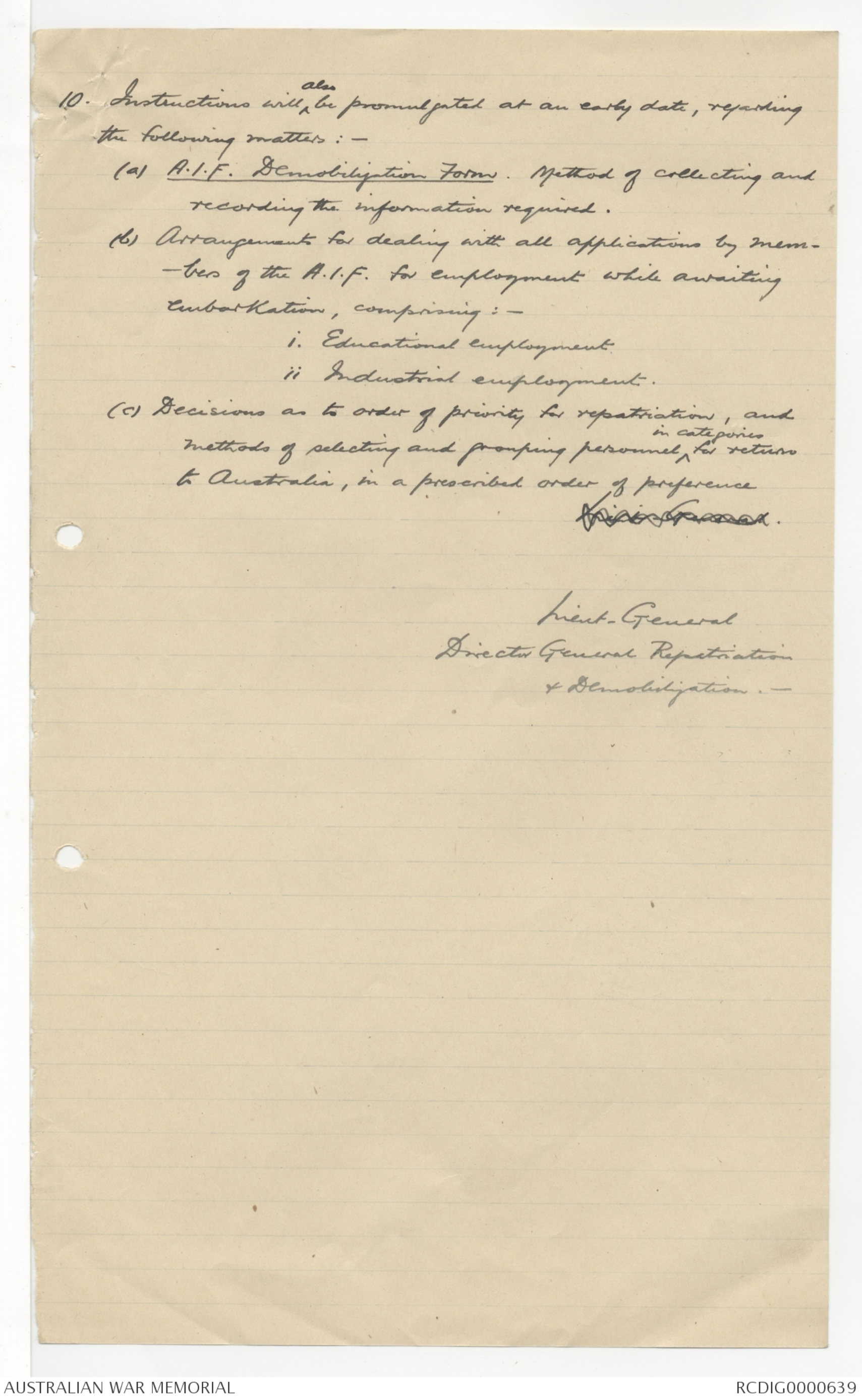
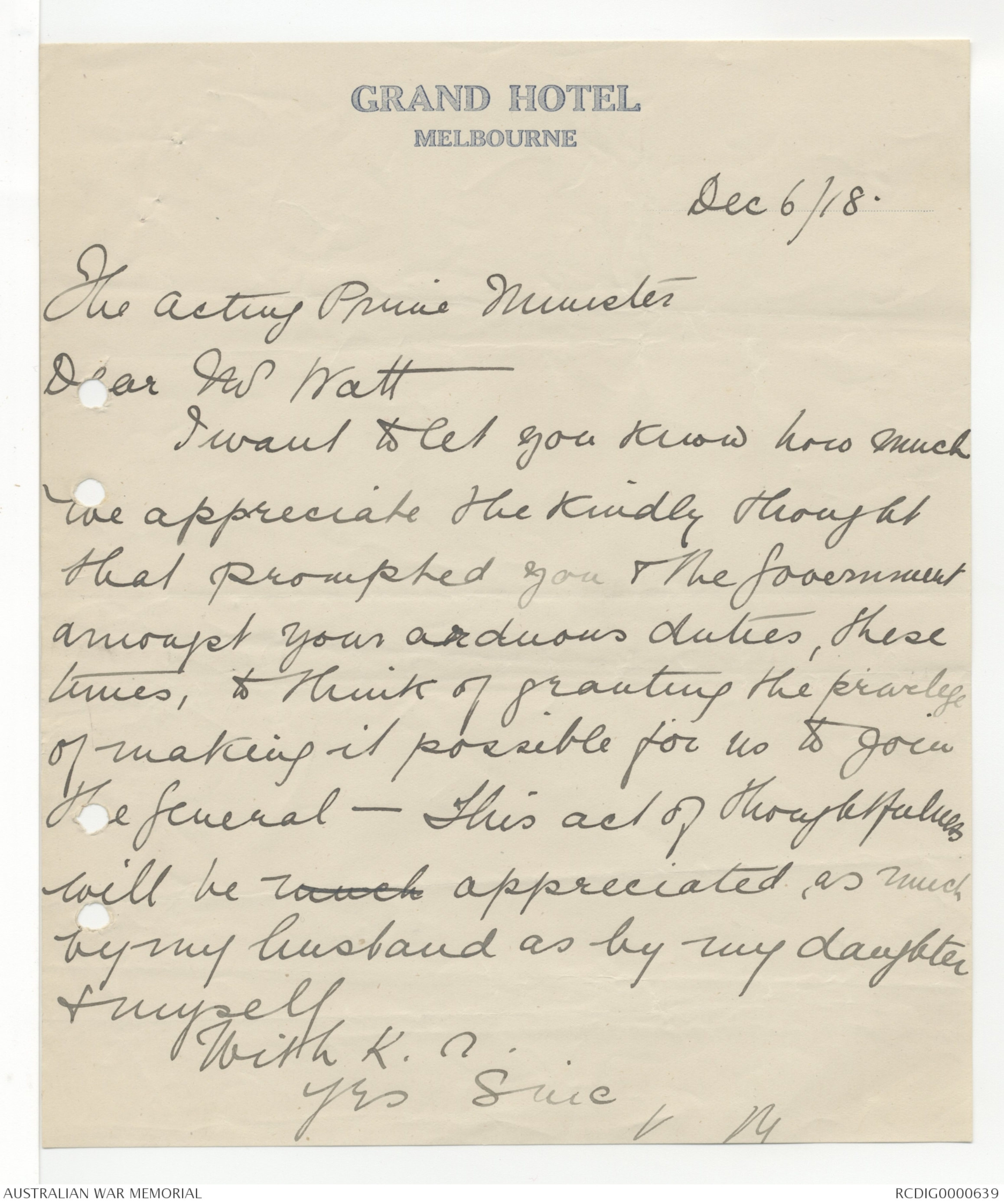
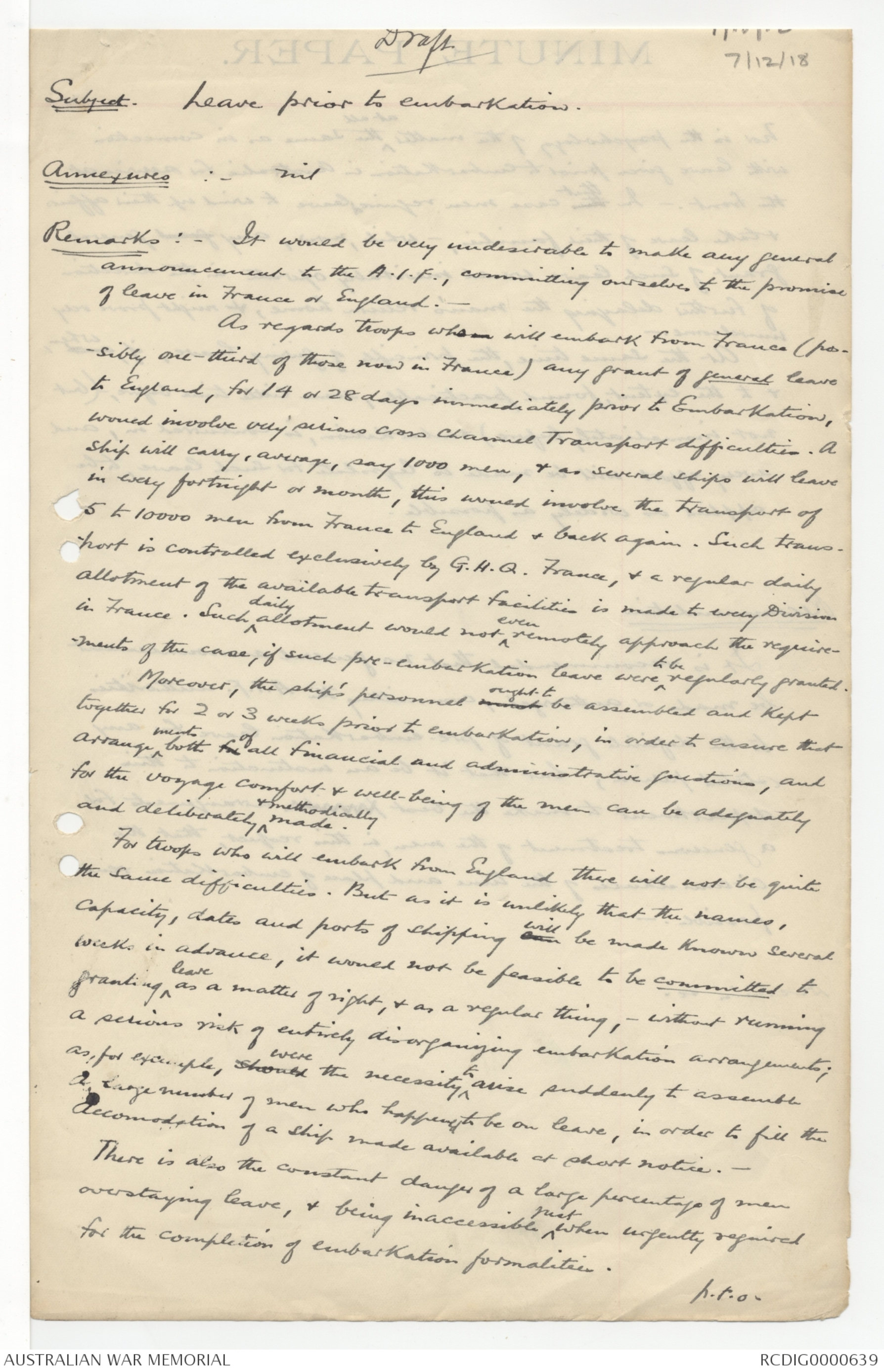
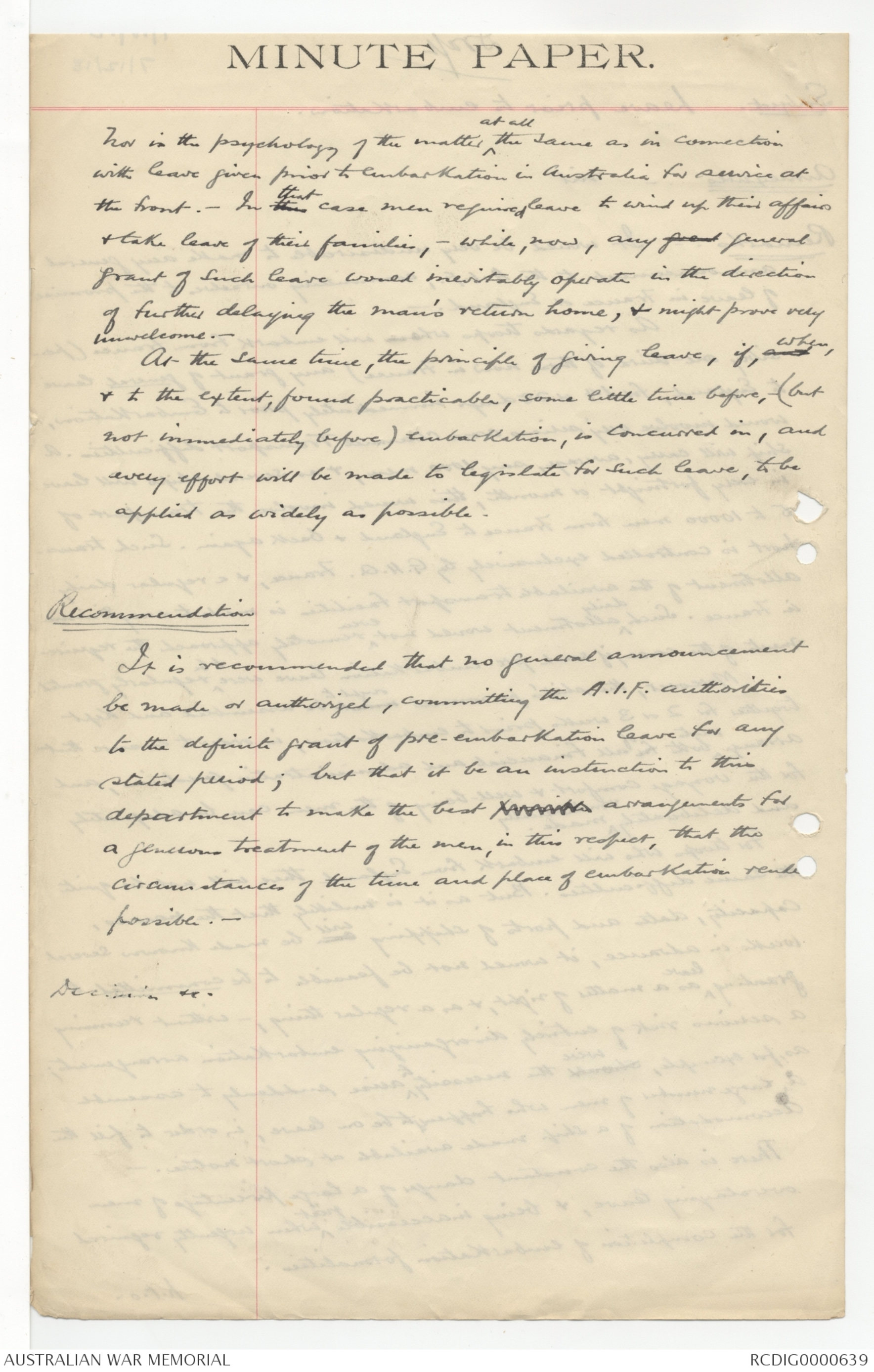
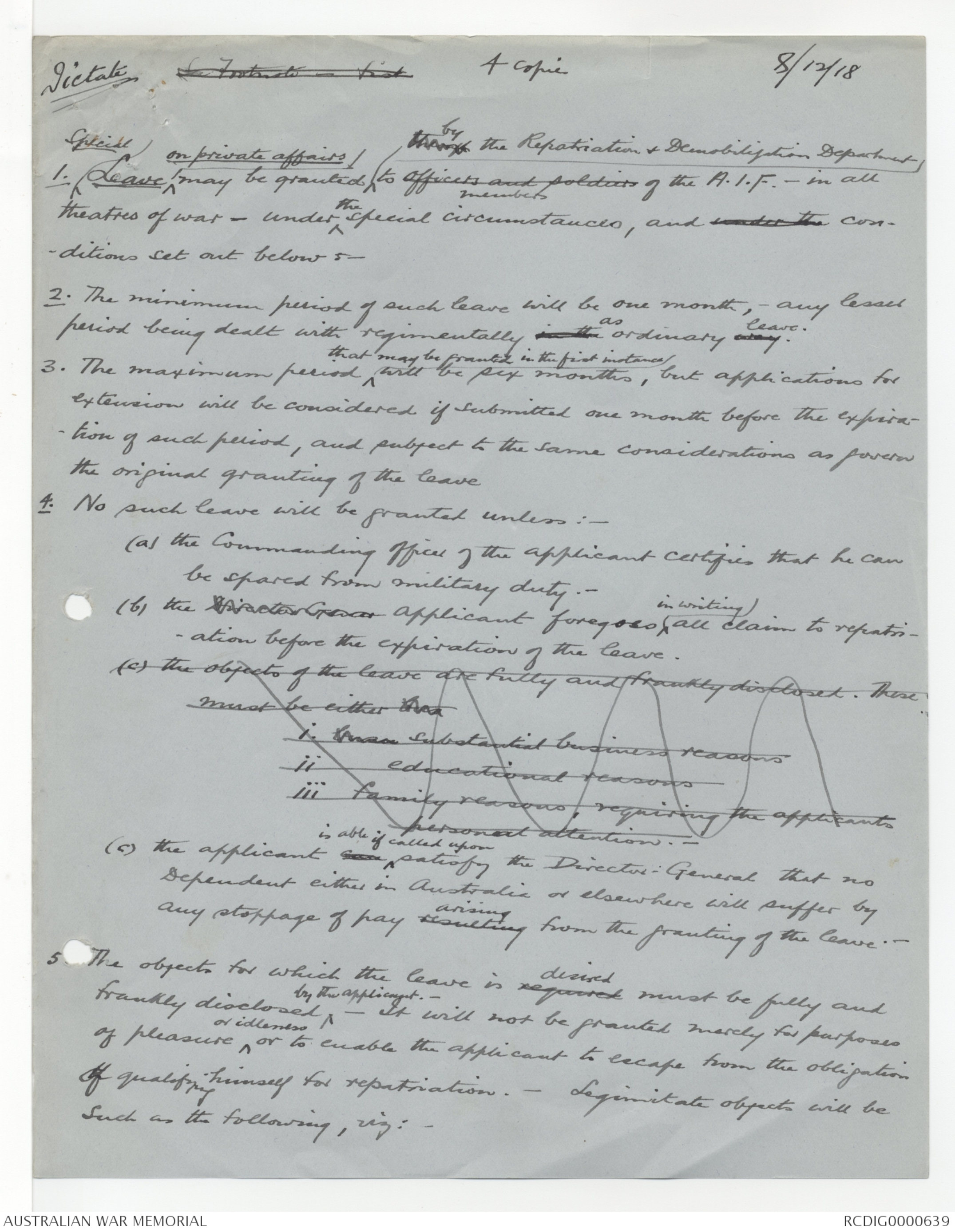
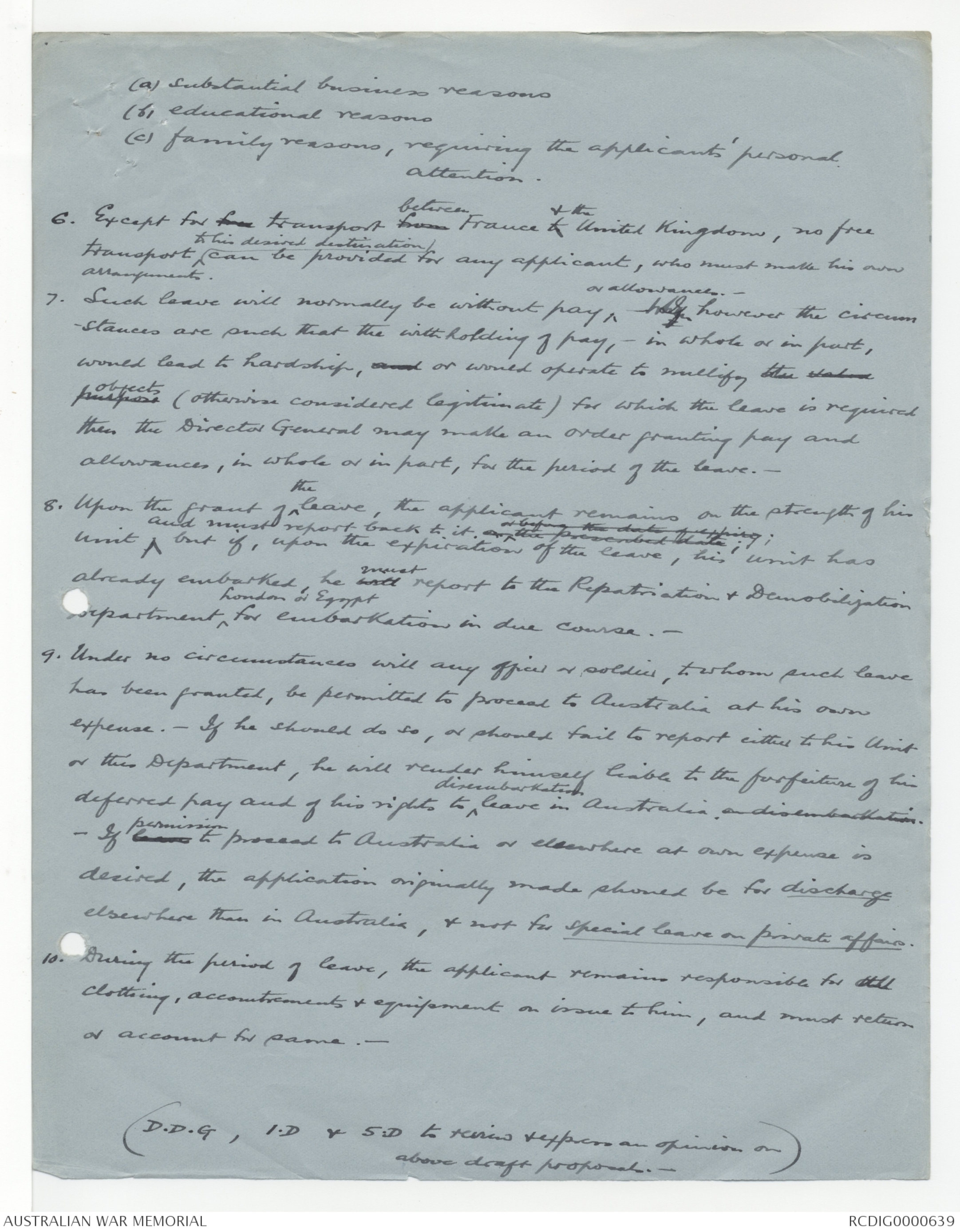
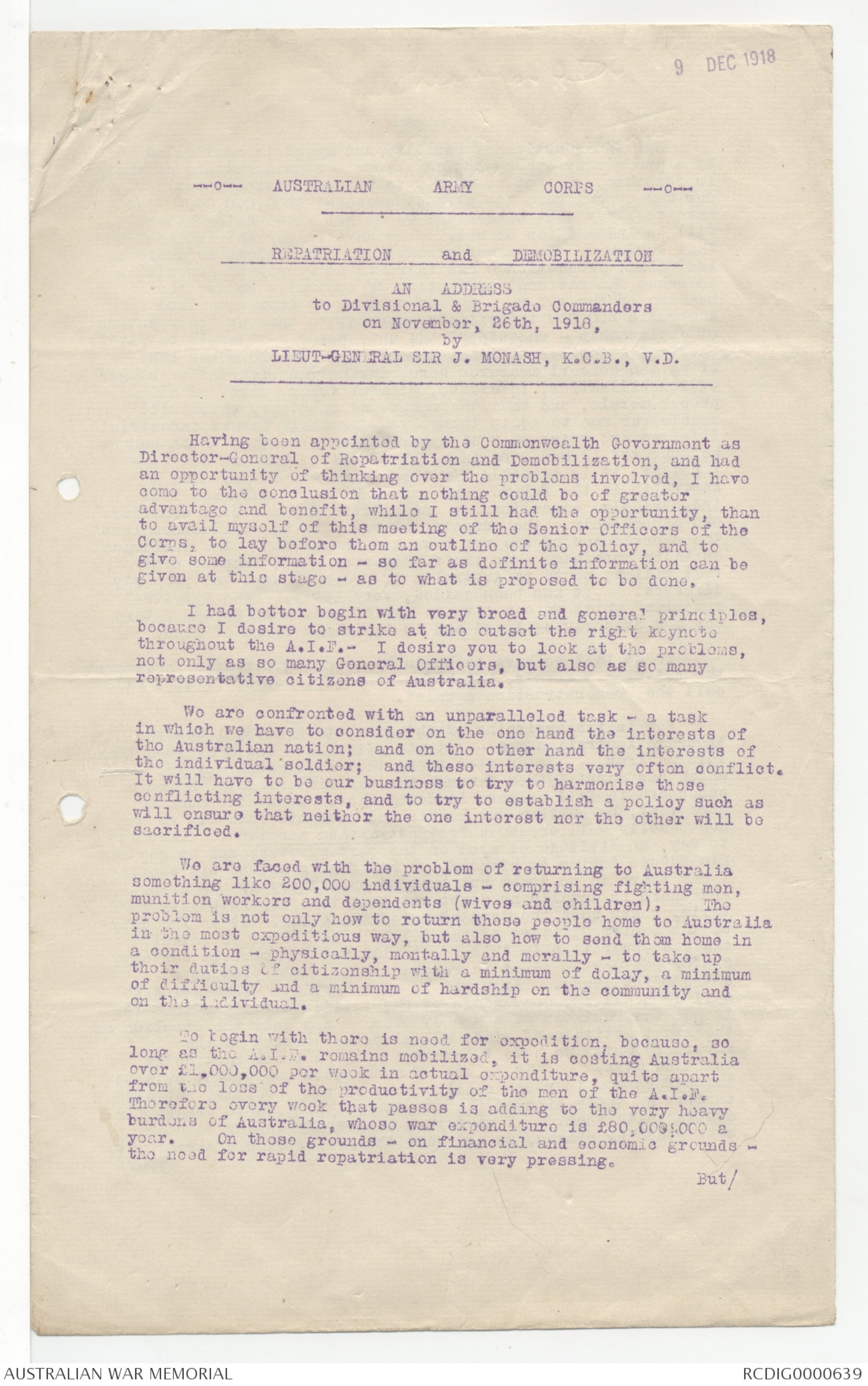
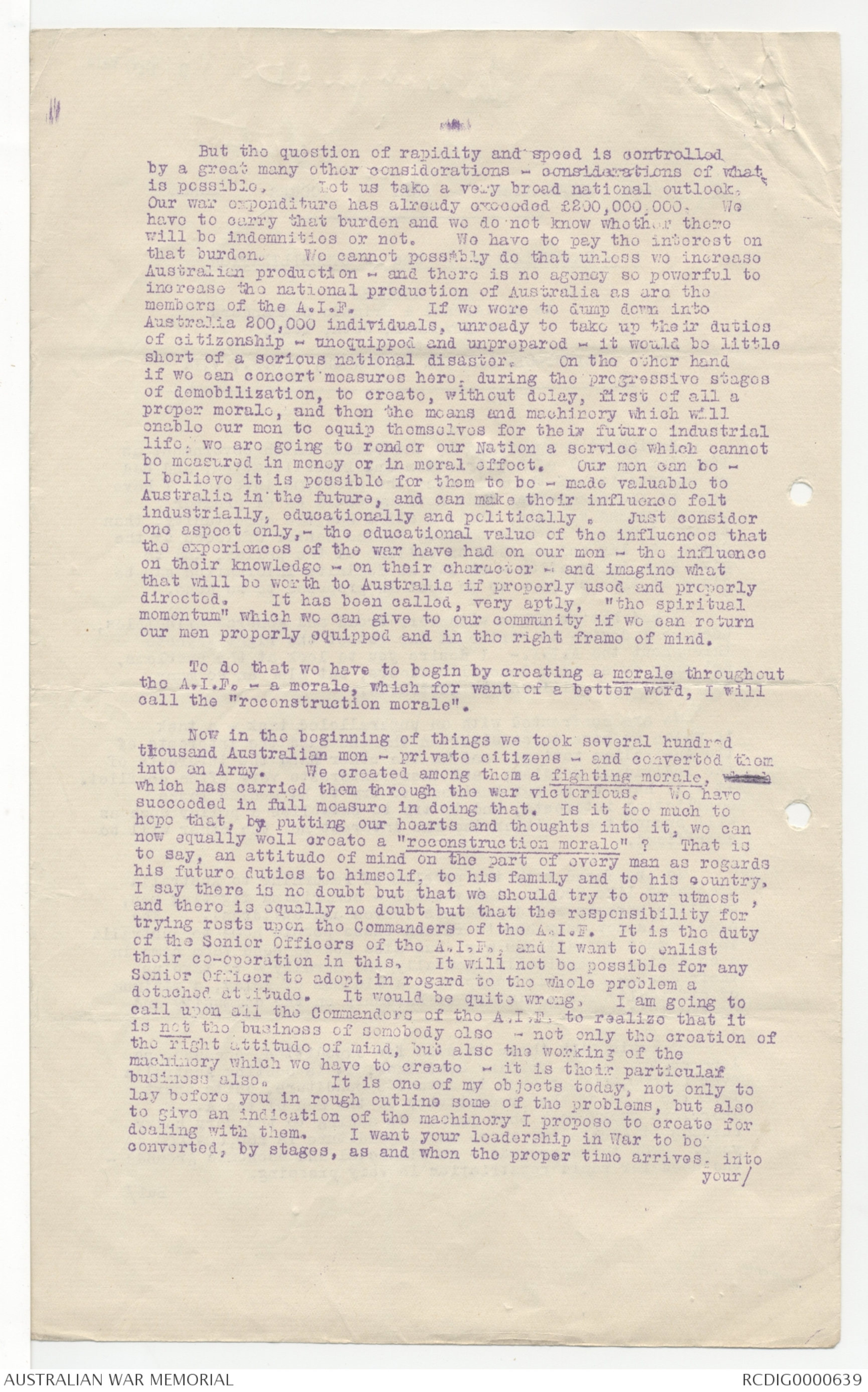
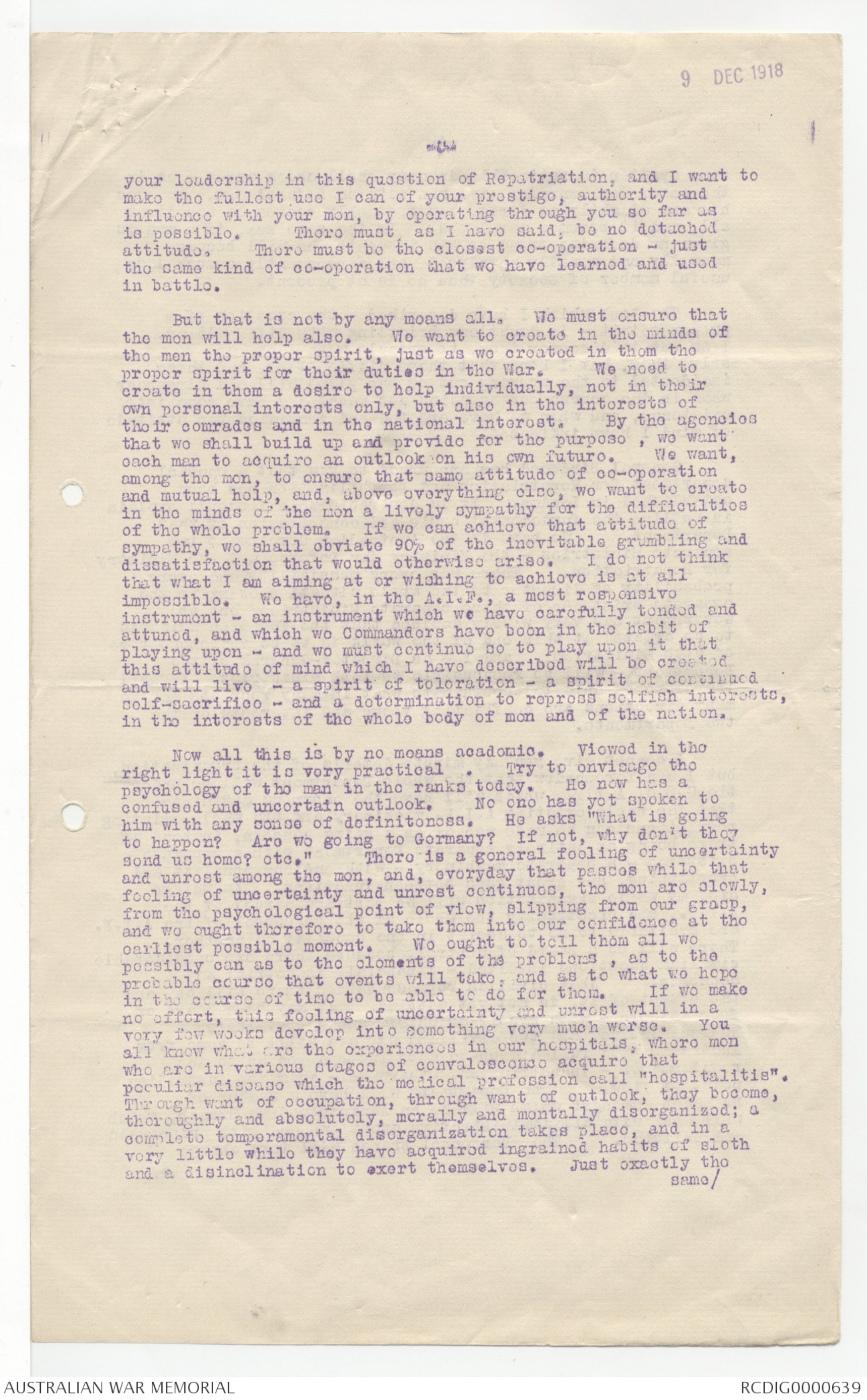
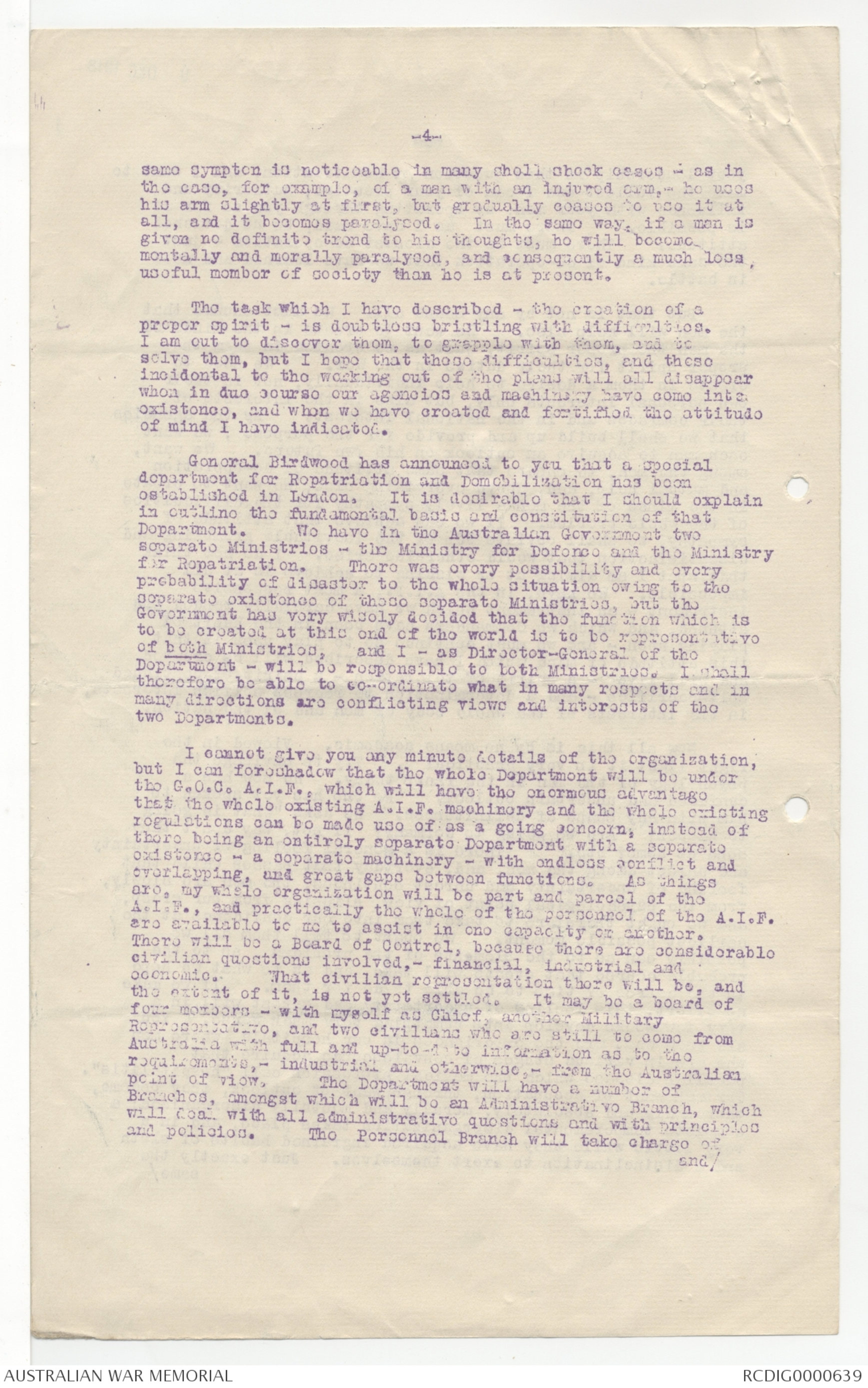
10. Instructions will ^also be promulgated at an early date, regarding
the following matter:-
(a) A.I.F. Demobilization Form. Method of collecting and
recording the information required.
(b) Arrangements for dealing with all applications by members
of the A.I.F. for employment while awaiting
embarkation, comprising:-
i. Educational employment
ii Industrial employment.
(c) Decisions as to order of priority for repatriation, and
methods of selecting and grouping personnel ^in categories for return
to Australia, in a prescribed order of preferenceLieut-General.
Lieut-General
Director General Repatriation
& Demobilization.-
GRAND HOTEL
MELBOURNE
Dec 6/18.
The Acting Prime Minister
Dear Mr Watt
I want to let you know how much
we appreciate the kindly thought
that prompted you & the Government
amongst your arduous duties, these
times, to think of granting the privelege
of making it possible for us to join
the General - This act of thoughtfulness
will be much appreciated, as much
by my husband as by my daughter
& myself
With K. N.
Yrs Sinc
K M
Draft
7/12/18
Subject. Leave prior to embarkation.
Annexures :- Nil
Remarks :- It would be very undesirable to make any general
announcement to the A.I.F., committing ourselves to the promise
of leave in France or England. -
As regards troops whon will embark from France (possibly
one-third of those now in France) any grant of general leave
to England, for 14 or 28 days immediately prior to Embarkation,
would involve very serious cross channel Transport difficulties. A
ship will carry, average, say 1000 men, & as several ships will leave
in every fortnight or month, this would involve the transport of
5 to 10000 men from France to England & back again. Such transport
is controlled exclusively by G.H.Q. France, & a regular daily
allotment of the available transport facilities is made to every Division
in France. Such ^daily allotment would not ^even remotely approach the requirements
of the case, if such pre-embarkation leave were ^to be regularly granted.
Moreover, the ship's personnel must ought to be assembled and Kept
together for 2 or 3 weeks prior to embarkation, in order to ensure that
arrange^ments both for of all financial and administrative questions, and
for the voyage comfort & well-being of the men can be adequately
and deliberately ^& methodically made.
For troops who will embark from England there will not be quite
the same difficulties. But as it is unlikely that the names,
capacity, dates and ports of shipping can will be made Known several
weeks in advance, it would not be possible to be committed to
granting ^leave as a matter of right, & as a regular thing, - without running
a serious risk of entirely disorganizing embarkation arrangements;
as, for example, should were the necessity ^to arise suddenly to assemble
a large number of men who happened to be on leave, in order to fill the
accomodation of a ship made available at short notice. -
There is also the constant danger of a large percentage of men
overstaying leave, & being inaccessible ^just when urgently required
for the completion of embarkation formalities.
p.t.o.
MINUTE PAPER.
Nor is the psychology of the matter ^at all the same as in connection
with leave given prior to embarkation in Australia for service at
the front. - In this that case men required leave to wind up their affairs
& take leave of their families, - while, now, any grant general
grant of such leave could inevitably operate in the direction
of further delaying the man's return home, & might prove very
unwelcome. -
At the same time, the principle of giving leave, if, and when,
& to the extent, found practicable, some little time before, -(but
not immediately before) embarkation, is concurred in, and
every effort will be made to legislate for such leave, to be
applied as widely as possible.
Recommendation
It is recommended that no general announcement
be made or authorized, committing the A.I.F. authorities
to the definite grant of pre-embarkation leave for any
stated period; but that it be an instruction to this
department to make the best possible arrangements for
a generous treatment of the men, in this respect, that the
circumstances of the time and place of embarkation render
possible. -
Decisions &c.
[*Dictate*]See Footnote - first
4 copies
8/12/18
1. ^Special Leave ^on private affairs may be granted ^through by the Repatriation & Demobilization Department to officers and soldiers members of the A.I.F. - in all
theatres of war - under ^the special circumstances, and under the conditions set out below:-
2. The minimum period of such leave will be one month, any lesser
period being dealt with regimentally in the as ordinary way. leave.
3. The maximum period ^that may be granted in the first instance will be six months, but applications for
extension will be considered if submitted one month before the expiration
of such period, and subject to the same considerations as govern
the original granting of the leave
4. No such leave will be granted unless :-
(a) the Commanding officer of the applicant certifies that he can
be spared from military duty. -
(b) the Director-Gener applicant foregoes ^in writing all claim to repatriation
before the expiration of the leave.(c) the objects of the leave are fully and frankly disclosed. Thesemust be either xxxi. busine substantial business reasonsii educational reasons -iii family reasons, requiring the applicantspersonal attention. -
(c) the applicant can ^is able if called upon satisfy the Director-General that no
Dependent either in Australia or elsewhere will suffer by
any stoppage of pay resulting arising from the granting of the leave. -
5. The objects for which the leave is required desired must be fully and
frankly disclosed ^by the applicant. - - It will not be granted merely for purposes
of pleasure ^or idleness or to enable to applicant to escape from the obligation
of qualifying himself for repatriation. - Legitimate objects will be
such as the following, viz: -
(a) substantial business reasons
(b) educational reasons
(c) family reasons, requiring the applicants' personal
attention.
6. Except for free transport from between France to & the United Kingdom, no free
transport ^to his desired destination can be provided for any applicant, who must make his own
arrangements.
7. Such leave will normally be without pay ^or allowances. - When If however the circumstances
are such that the with holding of pay, - in whole or in part,
would lead to hardship, and or would operate to nullify the validpurpose objects (otherwise considered legitimate) for which the leave is required
then the Director General may make an order granting pay and
allowances, in whole or in part, for the period of the leave. -
8. Upon the grant of ^the leave, the applicant remains on the strength of his
unit ^and must report back to it. ^on or before the date of expiry; the prescribed date; but if, upon the expiration of the leave, his unit has
already embarked, he will must report to the Repatriation & Demobilization
Department ^London or Egypt for embarkation in due course. -
9. Under no circumstances will any officer or solider, to whom such leave
has been granted, be permitted to proceed to Australia at his own
expense. - If he should do so, or should fail to report either to his Unit
or this Department, he will render himself liable to the forfeiture of his
deferred pay and of his rights to ^disembarkation leave in Australia. on disembarkation.
- If leave permission to proceed to Australia or elsewhere at own expense is
desired, the application originally made should be for discharge
elsewhere than in Australia, & not for special leave on private affairs.
10. During this period of leave, the applicant remains responsible for all
clothing, accoutrements & equipment on issue to him, and must return
& account for same. -
(D.D.G, 1.D & 5.D to review & express an opinion on
above draft proposals. - )
[*9 DEC 1918*]
AUSTRALIAN ARMY CORPS
REPATRIATION and DEMOBILIZATION
AN ADDRESS
to Divisional & Brigade Commanders
on November 26th, 1918,
by
LIEUT-GENERAL SIR J. MONASH, K.G.B., V.D.
Having been appointed by the Commonwealth Government as
Director-General of Repatriation and Demobilization, and had
an opportunity of thinking over the problems involved, I have
come to the conclusion that nothing could be of greater
advantage and benefit, while I still had the opportunity, than
to avail myself of this meeting of the Senior Officers of the
Corps, to lay before them an outline of the policy, and to
give some information - so far as definite information can be
given at this stage - as to what is proposed to be done.
I had better begin with very broad and general principles,
because I desire to strike at the outset the right keynote
throughout the A.I.F.- I desire you to look at the problems,
not only as so many General Officers, but also as so many
representative citizens of Australia.
We are confronted with an unparalleled task - a task
in which we have to consider on the one hand the interests of
the Australian nation; and on the other hand the interests of
the individual soldier; and these interests very often conflict.
It will have to be our business to try to harmonize these
conflicting interests, and to try to establish a policy such as
will ensure that neither the one interest nor the other will be
sacrificed.
We are faced with the problem of returning to Australia
something like 200,000 individuals - comprising fighting men,
munition workers and dependents (wives and children). The
problem is not only how to return these people home to Australia
in the most expeditious way, but also how to send them home in
a condition - physically, mentally and morally - to take up
their duties of citizenship with a minimum of delay, a minimum
of difficulty and a minimum of hardship on the community and
on the individual.
To begin with there is need for expedition, because, so
long as the A.I.F. remains mobilized, it is costing Australia
over ₤1,000,000 per week in actual expenditure, quite apart
from the loss of the productivity of the men of the A.I.F.
Therefore every week that passes is adding to the very heavy
burdens of Australia, whose war expenditure is £80,000,000 a
year. On these grounds - on financial and economic grounds -
the need for rapid repatriation is very pressing.
But/
-2-
But the question of rapidity and speed is controlled
by a great many other considerations - considerations of what
is possible. Let us take a very broad national outlook.
Our war expenditure has already exceeded ₤200,000,000. We
have to carry that burden and we do not know whether there
will be indemnities or not. We have to pay the interest on
that burden. We cannot possibly do that unless we increase
Australian production - and there is no agency so powerful to
increase the national production of Australia as are the
members of the A.I.F. If we were to dump down into
Australia 200,000 individuals, unready to take up their duties
of citizenship - unequipped and unprepared - it would be little
short of a serious national disaster. On the other hand
if we can concert measures here, during the progressive stages
of demobilization, to create, without delay, first of all a
proper morale, and then the means and machinery which will
enable our men to equip themselves for their future industrial
life, we are going to render our Nation a service which cannot
be measured in money or in moral effect. Our men can be -
I believe it is possible for them to be - made valuable to
Australia in the future, and can make their influence felt
industrially, educationally and politically. Just consider
one aspect only, - the educational value of the influences that
the experiences of the war have had on our men - the influence
on their knowledge - on their character - and imagine what
that will be worth to Australia if properly used and properly
directed. It has been called, very aptly, "the spiritual
momentum" which we can give to our community if we can return
our men properly equipped and in the right frame of mind.
To do that we have to begin by creating a morale throughout
the A.I.F. - a morale, which for want of a better word, I will
call the "reconstruction morale".
Now in the beginning of things we took several hundred
thousand Australian men - private citizens - and converted them
into an Army. We created among them a fighting morale, which
which has carried them through the war victorious. We have
succeeded in full measure in doing that. Is it too much to
hope that, by putting our hearts and thoughts into it, we can
now equally well create a "reconstruction morale" ? That is
to say, an attitude of mind on the part of every man as regards
his future duties to himself, to his family and to his country.
I say there is no doubt but that we should try to our utmost,
and there is equally no doubt but that the responsibility for
trying rests upon the Commanders of the A.I.F. It is the duty
of the Senior Officers of the A.I.F., and I want to enlist
their co-operation in this. It will not be possible for any
Senior Officer to adopt in regard to the whole problem a
detached attitude. It would be quite wrong. I am going to
call upon all the Commanders of the A.I.F. to realize that it
is not the business of somebody else - not only the creation of
the right attitude of mind, but also the working of the
machinery which we have to create - it is their particular
business also. It is one of my objects today, not only to
lay before you in rough outline some of the problems, but also
to give an indication of the machinery I propose to create for
dealing with them. I want your leadership in War to be
converted, by stages, as and when the proper time arrives, into
your/
[*9 DEC 1918*]
-3-
your leadership in this question of Repatriation, and I want to
make the fullest use I can of your prestige, authority and
influence with your men, by operating through you so far as
is possible. There must, as I have said, be no detached
attitude. There must be the closest co-operation - just
the same kind of co-operation that we have learned and used
in battle.
But that is not by any means all. We must ensure that
the men will help also. We want to create in the minds of
the men the proper spirit, just as we created in them the
proper spirit for their duties in the War. We need to
create in them a desire to help individually, not in their
own personal interests only, but also in the interests of
their comrades and in the national interest. By the agencies
that we shall build up and provide for the purpose, we want
each man to acquire an outlook on his own future. We want,
among the men, to ensure that same attitude of co-operation
and mutual help, and, above everything else, we want to create
in the minds of the men a lively sympathy for the difficulties
of the whole problem. If we can achieve that attitude of
sympathy, we shall obviate 90% of the inevitable grumbling and
dissatisfaction that would otherwise arise. I do not think
that what I am aiming at or wishing to achieve is at all
impossible. We have, in the A.I.F., a most responsive
instrument - an instrument which we have carefully tended and
attuned, and which we Commanders have been in the habit of
playing upon - and we must continue so to play upon it that
this attitude of mind which I have described will be created
and will live - a spirit of toleration - a spirit of continued
self-sacrifice - and a determination to repress selfish interests,
in the interests of the whole body of men and of the nation.
Now all this is by no means academic. Viewed in the
right light it is very practical. Try to envisage the
psychology of the man in the ranks today. He now has a
confused and uncertain outlook. No one has yet spoken to
him with any sense of definiteness. He asks "What is going
to happen? Are we going to Germany? If not, why don't they
send us home? etc." There is a general feeling of uncertainty
and unrest among the men, and, everyday that passes while that
feeling of uncertainty and unrest continues, the men are slowly,
from the psychological point of view, slipping from our group,
and we ought therefore to take them into our confidence at the
earliest possible moment. We ought to tell them all we
possibly can as to the elements of the problems, as to the
probable course that events will take, and as to what we hope
in the course of time to be able to do for them. If we make
no effort, this feeling of uncertainty and unrest will in a
very few weeks develop into something very much worse. You
all know what are the experiences in our hospitals, where men
who are in various stages of convalescence acquire that
peculiar disease which the medical profession call "hospitalitis".
Through want of occupation, through want of outlook, they become,
thoroughly and absolutely, morally and mentally disorganized; a
complete temperamental disorganization takes place, and in a
very little while they have acquired ingrained habits of sloth
and a disinclination to exert themselves. Just exactly the
same/
-4-
same symptom is noticeable in many shell shock cases - as in
the case, for example, of a man with an injured arm,- he uses
his arm slightly at first, but gradually ceases to use it at
all, and it becomes paralysed. In the same way, if a man is
given no definite trend to his thoughts, he will become
mentally and morally paralysed, and subsequently a much less,
useful member of society than he is at present.
The task which I have described - the creation of a
proper spirit - is doubtless bristling with difficulties.
I am out to discover them, to grapple with them, and to
solve them, but I hope that these difficulties, and these
incidental to the working out of the plans will all disappear
when in due course our agencies and machinery have come into
existence, and when we have created and fortified the attitude
of mind I have indicated.
General Birdwood has announced to you that a special
department for Repatriation and Demobilization has been
established in London. It is desirable that I should explain
in outline the fundamental basic and constitution of that
Department. We have in the Australian Government two
separate Ministries - the Ministry for Defence and the Ministry
for Repatriation. There was every possibility and every
probability of disaster to the whole situation owing to the
separate existence of these separate Ministries, but the
Government has very wisely decided that the function which is
to be created at this end of the world is to be representative
of both Ministries, and I - as Director-General of the
Department - will be responsible to both Ministries. I shall
therefore be able to co-ordinate what in many respects and in
many directions are conflicting views and interests of the
two Departments.
I cannot give you any minute details of the organization,
but I can foreshadow that the whole Department will be under
the G.O.C. A.I.F., which will have the enormous advantage
that the whole existing A.I.F. machinery and the whole existing
regulations can be made use of as a going concern, instead of
there being an entirely separate Department with a separate
existence - a separate machinery - with endless conflict and
overlapping, and great gaps between functions. As things
are, my whole organization will be part and parcel of the
A.I.F., and practically the whole of the personnel of the A.I.F.
are available to me to assist in one capacity or another.
There will be a Board of Control, because there are considerable
civilian questions involved,- financial, industrial and
economic. That civilian representation there will be, and
the extent of it, is not yet settled. It may be a board of
four members - with myself as Chief, another Military
Representative, and two civilians who are still to come from
Australia with full and up-to-date information as to the
requirements, - industrial and otherwise,- from the Australian
point of view. The Department will have a number of
Branches, amongst which will be an Administrative Branch, which
will deal with all administrative questions and with principles
and policies. The Personnel Branch will take charge of
and/
 Sandy Mudie
Sandy MudieThis transcription item is now locked to you for editing. To release the lock either Save your changes or Cancel.
This lock will be automatically released after 60 minutes of inactivity.